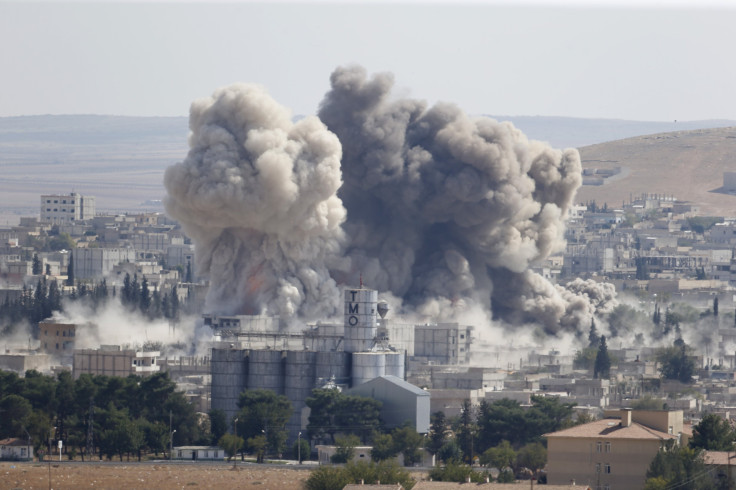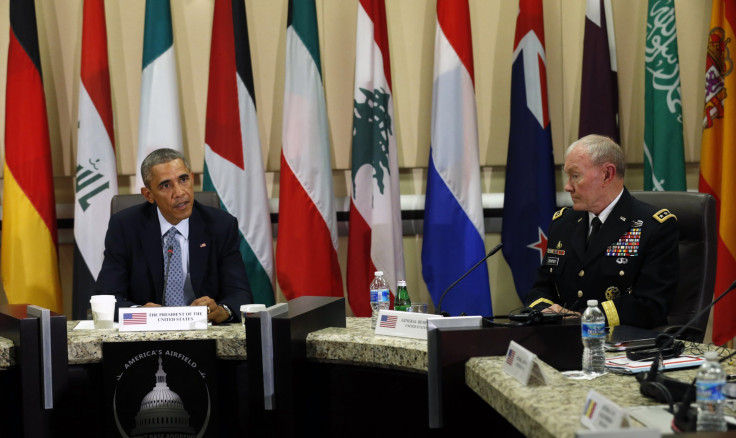ISIS Expansion: War Game Projects Islamic State Will Grow Regionally, Encountering Little Resistance

The Islamic State group, comprised of militant Islamist extremists from the Levant to North Africa to the Caucasus, is likely to expand in the Middle East and “project force globally,” with few countries stepping up to push back against the group’s expansion, simulations conducted by the Institute for the Study of War showed. Although ISIS, as the group is also known, constitutes one of several national security threats to the United States, “it is difficult for policymakers to discern the consequences of action or inaction even in the near future,” a report on the simulations published in July said.
“Few countries are willing or able to counter ISIS as a global phenomenon,” the simulations found, as no participants “took multi-front action to limit ISIS’s regional expansion, even though most participants opposed ISIS.” The report noted that several predictions established by the simulations, which were conducted Feb. 27 and March 16, have already come true, including an expansion of the Islamic State group’s control in Libya, multiple terrorist attacks during Ramadan and a major attack against tourists in North Africa.
.@ForeignPolicy map showcases territory ISIS has lost in Iraq & Syria, partially due to US led coalition airstrikes. pic.twitter.com/P95HFKesjg
— Josh Freedman (@jfreedman2009) July 7, 2015As the Islamic State group grows stronger, the U.S.’s options will likely diminish if it avoids or delays acting against the group, the Institute for the Study of War’s report predicted. “ISIS is a brutal, capable enemy that seeks to break modern states and establish a worldwide caliphate,” wrote Harleen Gambhir, the author, in the report. “Countering ISIS’s global strategy is extremely difficult.”
The Islamic State group, also known as ISIS or ISIL, came to global attention in June 2014 when it overtook Mosul, Iraq’s second-largest city, and declared a caliphate comprised of territory in Iraq and Syria. Its de facto capital is in Raqqa, Syria, but branches and supporters have emerged elsewhere, including North Africa, Afghanistan and the Caucasus, as new members declare their allegiance to Abu Bakr al-Baghdadi, the group’s leader.
“The military planners in the simulation perceived that the United States does not have enough armed forces to undertake a multi-theater campaign to degrade and defeat ISIS on its own,” the report explained. ”The U.S. therefore must choose between increasing its armed forces, relying on coalition partners to achieve the defined mission, or changing the defined mission against ISIS.”
War against ISIS: Bases and Franchises @TheEconomist @LegatumInst [Institute for the Study of War] pic.twitter.com/1x7JHKgjUo
— MESP (@mestrate) July 13, 2015The U.S. is leading a coalition carrying out airstrikes against the Islamic State group in Iraq and Syria. It has carried out more than 5,000 airstrikes against Islamic State group targets, U.S. President Barack Obama said July 6. “We’ve eliminated thousands of fighters, including senior ISIL commanders,” Obama said. “Over the past year we've seen that, when we have an effective partner on the ground, ISIL can be pushed back. As with any military effort, there will be periods of progress but there are also going to be some setbacks, as we’ve seen with ISIL’s gains in Ramadi in Iraq and in Central and Southern Syria."

Without a clearly articulated strategy to push back against ISIS’ rapid expansion, the United States would have to rely on other states in the region, such as Saudi Arabia, Egypt and Jordan, especially given certain advantages that ISIS has. “It can project force from disparate regions, potentially exploiting fissures between multiple international organizations and U.S. combatant commands,” the report warned. “The U.S. risks strategic failure even if ISIS does not attempt coherent action across global fronts.”
But, the report also warned, the United States could not afford to focus solely on the Islamic State group, as neglecting to also fight other extremist groups could have dire consequences. “A strategy focused on ISIS alone likely will allow other actors to thrive,” the report concluded.
© Copyright IBTimes 2024. All rights reserved.





















